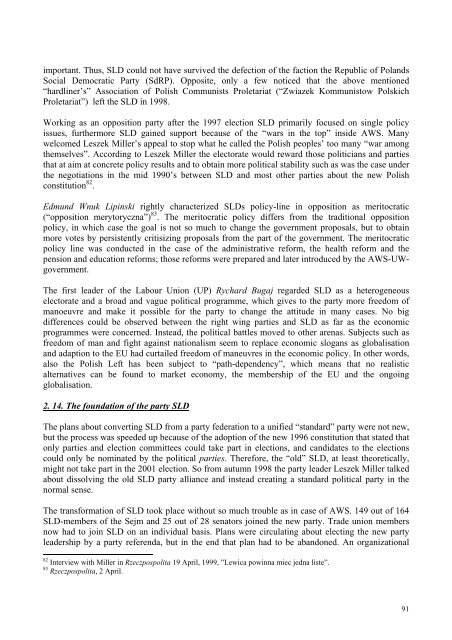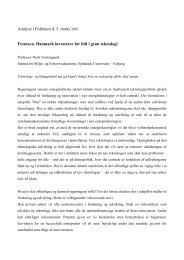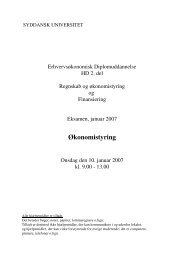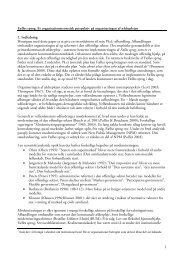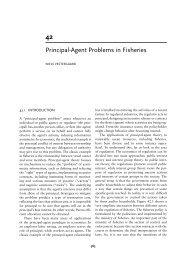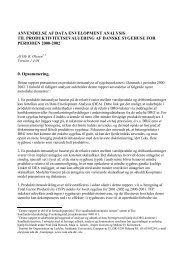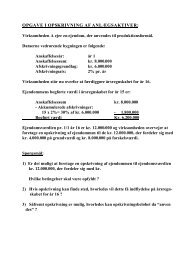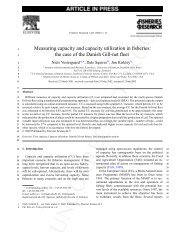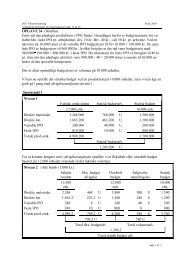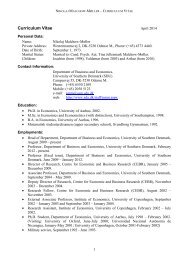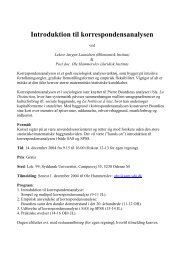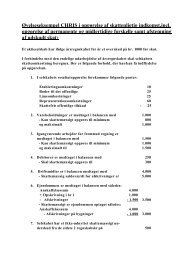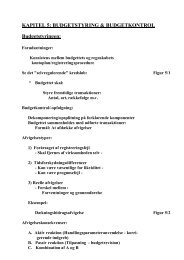the fall<strong>in</strong>g popular support for privatization <strong>of</strong> the state enterprises 80 . Many voters shared theop<strong>in</strong>ion that “Pol<strong>and</strong> does not have the type <strong>of</strong> market economy that we expected” (<strong>in</strong> 1989), <strong>and</strong>ma<strong>in</strong>ly for that reason many decided to vote “post-communist”. Opposite, the popular support forprivatisation <strong>and</strong> market economy has been greatest under “post-communist” led governments.Up to the 1997 election some observers talked about three currents <strong>in</strong>side SLD:• a social-liberal supported by Aleks<strong>and</strong>er Kwasniewski• a centrist supported Josef Oleksy• f<strong>in</strong>ally a more dogmatic l<strong>in</strong>e supported by the trade union OPZZ <strong>and</strong> m<strong>in</strong>ister for labour, LeszekMiller 81 .The social-liberal group ab<strong>and</strong>oned Marxist Len<strong>in</strong>ist th<strong>in</strong>k<strong>in</strong>g; <strong>in</strong>stead aim<strong>in</strong>g to <strong>in</strong>troduce marketeconomy <strong>and</strong> political capitalism on favourable conditions for “nomenklatura entrepreneurs”. The“social-liberal versus orthodox” divide, however, was never razor-sharp <strong>and</strong> chang<strong>in</strong>g over time.After the take over <strong>of</strong> the post as the chairman <strong>of</strong> the SLD Leszek Miller followed a pragmatic l<strong>in</strong>e,appeal<strong>in</strong>g to the new middle class <strong>and</strong> support<strong>in</strong>g market economy <strong>and</strong> Polish membership <strong>of</strong>NATO <strong>and</strong> the EU. The left pr<strong>of</strong>ile was mostly expressed <strong>in</strong> the attitudes to the church <strong>and</strong> thecommunist past. The majority <strong>of</strong> those who voted SLD have been critical to church leaders’dem<strong>and</strong>s about the restrictive abortion rules, the <strong>in</strong>equality between man <strong>and</strong> woman <strong>and</strong> theobligatory religious <strong>in</strong>struction <strong>in</strong> schools <strong>and</strong> other forms <strong>of</strong> church <strong>in</strong>terference <strong>in</strong> political life.The social composition <strong>of</strong> SLD’s voters has changed over time. At the 1991 election SLD obta<strong>in</strong>ed13-14 pct. <strong>of</strong> the votes among the best educated, only surpassed by Democratic Union (UD), thelater Freedom Union (UD). The support among the students was lower (5.7 pct.) <strong>and</strong> SLD was alsoshort <strong>of</strong> votes among workers <strong>and</strong> women. At the 1993 election SLD ga<strong>in</strong>ed 20 pct. <strong>of</strong> the welleducatedvoted SLD, 13 pct. among the lower educated <strong>and</strong> 20 pct. among the lowest educated.More <strong>in</strong>terest<strong>in</strong>g, at the 1997 election 23 pct. among the private entrepreneurs voted SLD, mak<strong>in</strong>gSLD the strongest party <strong>in</strong>side that social group. The liberal Democratic Union (UD) had to contentitself with 18 pct.That trend was confirmed at the 1997 election. Thus, measured by social support SLD cannot beconsidered as class party (Knuzewski, 1998:152), but SLD had many loyal voters, so the alternativefor many dissatisfied voters has been not to vote at all, what could be observed at the 2002 regional<strong>and</strong> local elections. In step with the stronger voter support <strong>in</strong> the late 1990’s the social support basebecame broader. Before the 2001 election SLD had the greatest support <strong>in</strong> all bigger social groups<strong>and</strong> succeeded to ma<strong>in</strong>ta<strong>in</strong> a pr<strong>of</strong>ile as a pr<strong>of</strong>essionally led <strong>and</strong> well <strong>in</strong>stitutionalized catch-all typepolitical party.In spite <strong>of</strong> different factions SLD behaved as a discipl<strong>in</strong>ed alliance, <strong>in</strong> part because <strong>of</strong> the pressurefrom outside, e.g. the dem<strong>and</strong>s from the Right for <strong>in</strong>creased de-communisation (“dekomunizacja”).The fact that SLD had a well-organized political core <strong>in</strong> the shape <strong>of</strong> the party SdRP, was also an80 Lena Kolarska-Bob<strong>in</strong>ska, ”Kapitalizm nie taki, jaki mial byc”, Gazeta Wyborcza 6.-7.11., 1999, ”Swiateczna”:2.81 Rzeczpospolita 20.9., 1993:6.90
important. Thus, SLD could not have survived the defection <strong>of</strong> the faction the Republic <strong>of</strong> Pol<strong>and</strong>sSocial Democratic <strong>Party</strong> (SdRP). Opposite, only a few noticed that the above mentioned“hardl<strong>in</strong>er’s” Association <strong>of</strong> Polish Communists Proletariat (“Zwiazek Kommunistow PolskichProletariat”) left the SLD <strong>in</strong> 1998.Work<strong>in</strong>g as an opposition party after the 1997 election SLD primarily focused on s<strong>in</strong>gle policyissues, furthermore SLD ga<strong>in</strong>ed support because <strong>of</strong> the “wars <strong>in</strong> the top” <strong>in</strong>side AWS. Manywelcomed Leszek Miller’s appeal to stop what he called the Polish peoples’ too many “war amongthemselves”. Accord<strong>in</strong>g to Leszek Miller the electorate would reward those politicians <strong>and</strong> partiesthat at aim at concrete policy results <strong>and</strong> to obta<strong>in</strong> more political stability such as was the case underthe negotiations <strong>in</strong> the mid 1990’s between SLD <strong>and</strong> most other parties about the new Polishconstitution 82 .Edmund Wnuk Lip<strong>in</strong>ski rightly characterized SLDs policy-l<strong>in</strong>e <strong>in</strong> opposition as meritocratic(“opposition merytoryczna”) 83 . The meritocratic policy differs from the traditional oppositionpolicy, <strong>in</strong> which case the goal is not so much to change the government proposals, but to obta<strong>in</strong>more votes by persistently critisiz<strong>in</strong>g proposals from the part <strong>of</strong> the government. The meritocraticpolicy l<strong>in</strong>e was conducted <strong>in</strong> the case <strong>of</strong> the adm<strong>in</strong>istrative reform, the health reform <strong>and</strong> thepension <strong>and</strong> education reforms; those reforms were prepared <strong>and</strong> later <strong>in</strong>troduced by the AWS-UWgovernment.The first leader <strong>of</strong> the Labour Union (UP) Rychard Bugaj regarded SLD as a heterogeneouselectorate <strong>and</strong> a broad <strong>and</strong> vague political programme, which gives to the party more freedom <strong>of</strong>manoeuvre <strong>and</strong> make it possible for the party to change the attitude <strong>in</strong> many cases. No bigdifferences could be observed between the right w<strong>in</strong>g parties <strong>and</strong> SLD as far as the economicprogrammes were concerned. Instead, the political battles moved to other arenas. Subjects such asfreedom <strong>of</strong> man <strong>and</strong> fight aga<strong>in</strong>st nationalism seem to replace economic slogans as globalisation<strong>and</strong> adaption to the EU had curtailed freedom <strong>of</strong> maneuvres <strong>in</strong> the economic policy. In other words,also the Polish Left has been subject to “path-dependency”, which means that no realisticalternatives can be found to market economy, the membership <strong>of</strong> the EU <strong>and</strong> the ongo<strong>in</strong>gglobalisation.2. 14. The foundation <strong>of</strong> the party SLDThe plans about convert<strong>in</strong>g SLD from a party federation to a unified “st<strong>and</strong>ard” party were not new,but the process was speeded up because <strong>of</strong> the adoption <strong>of</strong> the new 1996 constitution that stated thatonly parties <strong>and</strong> election committees could take part <strong>in</strong> elections, <strong>and</strong> c<strong>and</strong>idates to the electionscould only be nom<strong>in</strong>ated by the political parties. Therefore, the “old” SLD, at least theoretically,might not take part <strong>in</strong> the 2001 election. So from autumn 1998 the party leader Leszek Miller talkedabout dissolv<strong>in</strong>g the old SLD party alliance <strong>and</strong> <strong>in</strong>stead creat<strong>in</strong>g a st<strong>and</strong>ard political party <strong>in</strong> thenormal sense.The transformation <strong>of</strong> SLD took place without so much trouble as <strong>in</strong> case <strong>of</strong> AWS. 149 out <strong>of</strong> 164SLD-members <strong>of</strong> the Sejm <strong>and</strong> 25 out <strong>of</strong> 28 senators jo<strong>in</strong>ed the new party. Trade union membersnow had to jo<strong>in</strong> SLD on an <strong>in</strong>dividual basis. Plans were circulat<strong>in</strong>g about elect<strong>in</strong>g the new partyleadership by a party referenda, but <strong>in</strong> the end that plan had to be ab<strong>and</strong>oned. An organizational82 Interview with Miller <strong>in</strong> Rzeczpospolita 19 April, 1999, ”Lewica pow<strong>in</strong>na miec jedna liste”.83 Rzeczpospolita, 2 April.91
- Page 3:
“This provisional situation chara
- Page 6 and 7:
marketisation and privatisationshor
- Page 8 and 9:
purposes, are channels for “expre
- Page 10 and 11:
the significance of strategic choic
- Page 12 and 13:
presidentialism gave rise to “flo
- Page 14 and 15:
antipolitics and reinforcement of a
- Page 16 and 17:
In the late 1990’s elections most
- Page 18 and 19:
determined primarily by “politica
- Page 20 and 21:
politics and antipolitics, all sign
- Page 22 and 23:
which attitudes to state regulation
- Page 24 and 25:
Anti-communism has been defined in
- Page 26 and 27:
elections and the Slovak communists
- Page 28 and 29:
Cartel agreementsbetter representat
- Page 30 and 31:
Basically the absence of clear cons
- Page 32 and 33:
After 1989 different types of polit
- Page 34 and 35:
complex project for transition unde
- Page 36 and 37:
window of opportunity in spite of s
- Page 38 and 39:
analyses of party institutionalizat
- Page 40 and 41: political messages and slogans. Thu
- Page 42 and 43: well established party culture may
- Page 44 and 45: expected, much due to the many spli
- Page 46 and 47: Furthermore, the polarisation on el
- Page 48 and 49: Finally, Solidarity can also be con
- Page 50 and 51: whole, on the one side an authorita
- Page 52 and 53: The economic recession and the grav
- Page 54 and 55: election defeat more cooperation an
- Page 56 and 57: The formation of AWS can be conside
- Page 58 and 59: group. RS AWS constituted the Chris
- Page 60 and 61: According to the original plans the
- Page 62 and 63: values. According to Rybicki, as so
- Page 64 and 65: AWS should fight against all types
- Page 66 and 67: 2001 parliamentary election, howeve
- Page 68 and 69: and workers voted ZChN. At the 1993
- Page 70 and 71: The League has been considered as a
- Page 72 and 73: establishment like than LPR’s. Th
- Page 74 and 75: jobs in rural areas, especially sma
- Page 76 and 77: industrial policy. According to the
- Page 78 and 79: pressurizing the government to give
- Page 80 and 81: democrats, thereby locating itself
- Page 82 and 83: To conclude, the Freedom Union (UW)
- Page 84 and 85: Polish middle class. Thus, in Janua
- Page 86 and 87: such as KSCM and KSS in The Czech R
- Page 88 and 89: The SLD leaders were mainly recruit
- Page 92 and 93: innovation was formation of the pol
- Page 94 and 95: place after talks with each applica
- Page 96 and 97: Has the Left any freedom of manoeuv
- Page 98 and 99: medicine, changes in the labour cod
- Page 100 and 101: The Labour Union (UP), Democratic U
- Page 102: Nevertheless, before that had taken


